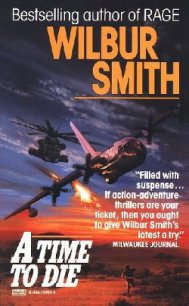Elephant Song - Smith Wilbur (книги бесплатно без онлайн txt) 📗
Johnny Nzou broke the tragic spell that held them. He walked slowly to where the two old cows lay at the head of the herd. They lay side by side, shoulders touching, with their legs folded neatly under them, kneeling as though still alive with only the pulsing fountain of life-blood from their foreheads to spoil the illusion.
Johnny set the butt of his rifle on the ground and leaned upon it, studying the two old matriarchs for a long regretful moment. He was unaware that Jock was filming him. His actions and his words were completely unstudied and unrehearsed. Hamba gable, Amakbulu, he whispered. Go in peace, old grandmothers. You are together in death as you were in life.
Go in peace, and forgive us for what we have done to your tribe. He walked away to the edge of the tree-line. Daniel did not follow him.
He understood that Johnny wanted to be alone for a while now. The other rangers also avoided each other. There was no banter, nor self-congratulation; two of them wandered amongst the mountainous dead with a strangely disconsolate air; a third squatted where he had fired his last shot, smoking a cigarette and studying the dusty ground between his feet, while the last one had laid aside his rifle and, with hands thrust in his pockets and shoulders hunched, stared at the sky and watched the vultures gather.
At first the carrion birds were tiny specks against the glaring alps of cumulus cloud, like grains of pepper sprinkled on a tablecloth.
Then they soared closer overhead, forming circling squadrons, turning on their wide wings in orderly formations, a dark wheel of death high above the killing-ground, and their shadows flitted over the piled carcasses in the centre of Long Vlei.
Forty minutes later Daniel heard the rumble of the approaching trucks, and saw them coming slowly through the forest. A squad of half-naked axemen ran ahead of the convoy, cutting out the brush and making a rough track for them to follow.
Johnny stood up with obvious relief from where he had been sitting alone at the edge of the trees, and came to take charge of the butchering.
The piles of dead elephant were pulled apart with winches and chains.
Then the wrinkled grey skin was sliced through down the length of the belly and the spine. Again the electric winches were brought into play and the skin was flensed off the carcass with a crackling sound as the subcutaneous tissue released its grip. It came off in long slabs, grey and corrugated on the outside, gleaming white on the inside. The men laid each strip on the dusty earth and heaped coarse salt upon it The naked carcasses looked strangely obscene in the bright sunlight, wet and marbled with white fat and exposed scarlet muscle, the swollen bellies bulging as though to invite the stroke of the flensing knives.
A skinner slipped the curved point of the knife into the belly of one of the old cows at the point where it met the sternum.
Carefully controlling the depth of the cut so as not to puncture the entrails, he walked the length of the body drawing the blade like a zipper down the belly pouch so that it gaped open and the stomach sac bulged out, glistening like the silk of a parachute.
Then the colossal coils of the intestines slithered after it.
These seemed to have a separate life. Like the body of an awakening python, they twisted and unfolded under the impetus of their own slippery weight.
The chainsaw men set to work. The intrusive clatter of the two-stroke engines seemed almost sacrilegious in this place of death, and the exhausts blew snorting blue smoke into the bright air. They lopped the limbs off each carcass, and a fine mush of flesh and bone chips flew in a spray from the teeth of the spinning steel chains.
Then they buzzed through the spine and ribs, and the carcasses fell into separate parts that were winched into the waiting refrigerator trucks.
A special gang went from carcass to carcass with long boat-hooks, poking in the soft wet mounds of spilled entrails to drag out the wombs of the females. Daniel watched as they split open one of the engorged wombs, dark purple with its covering of enlarged blood vessels. From the foetal sac, in a flood of amniotic fluid the foetus, the size of a large dog, slid out and lay in the trampled grass.
It was only a few weeks from term, a perfect little elephant covered with a coat of reddish hair that it would have lost soon after birth.
It was still alive, moving its trunk feebly. Kill it, Daniel ordered harshly in Sindebele. It was improbable that it could feel pain, but he turned away in relief as one of the men struck off the tiny head with a single blow of his panga. Daniel felt nauseated, but he knew that nothing from the cull should be wasted. The skin of the unborn elephant would be finegrained and valuable, worth a few hundred dollars for a handbag or a briefcase.
To distract himself he walked away across the killing-ground.
All that remained now were the heads of the great animals and the glistening piles of their entrails. From the guts nothing of value could be salvaged and they would be left for the vultures and hyena and jackal.
The ivory tusks, still embedded in their castles of bone, were the most precious part of the cull. The poachers and the ivoryhunters of old would not risk damaging them with a careless axe-stroke, and customarily would leave the ivory in the skull until the cartilaginous sheath that held it secure rotted and softened and released its grip.
Within four or five days the tusks could usually be drawn by hand, perfect and unmarked.
However, there was no time to waste on this procedure. The tusks must be cut out by hand.
The skinners who did this were the most experienced men, usually older, with grey woolly heads and bloodstained loincloths.
They squatted beside the heads and tapped patiently with their native axes.
While they were engaged in this painstaking work Daniel stood with Johnny Nzou. Jock held the Sony VTR on them as Daniel commented, Gory work.
But necessary, Johnny agreed shortly. On an average each adult elephant will yield about three thousand dollars in ivory, skin and meat. To many people that will sound pretty commercial, especially as they have just witnessed the hard reality of the cull. Daniel shook his head. You must know that there is a very strong campaign, led by the animal rights groups, to have the elephant placed on Appendix One of CITES, that is the Convention on International Trade in Endangered Species. Yes, I know.
If that happens it would prohibit the trade in any elephant products, skin, ivory or meat. What do you think of that, Warden? It makes me very angry. Johnny dropped his cigarette and. ground it under his heel.
His expression was savage. It would prevent any further culling operations, wouldn't it? Daniel persisted. Not at all, Johnny contradicted him. We would still be forced to control the size of the herds. We would still be forced to cull. The only difference would be that we could not sell the elephant products. They would be wasted, a tragic criminal waste. We would lose millions of dollars of revenue which at present is being used to protect and enlarge and service the wildlife sanctuaries. . . Johnny broke off and watched as a tusk was lifted out of the channel in the spongy bone of the skull by two of the skinners and laid carefully on the dry brown grass.
Skilfully one of them drew the nerve, a soft grey gelatinous core, from the hollow end of the tusk. Then Johnny went on, That tusk makes it easier for us to justify the continued existence of the Parks and the animals they contain to the local tribes-people living in close contact with wild animals on and near the boundaries of the national wilderness areas. I don't understand, Daniel encouraged him. Do you mean the local tribes resent the Parks and the animal population? Not if they can derive some personal benefit from them. If we can prove to them that a cow elephant is worth three thousand dollars and that a foreign safari hunter will spend fifty or even a hundred thousand dollars to hunt a trophy bull, if we can show them that a single elephant is worth a hundred, even a thousand of their goats or scrawny cattle and that they will see some of that money coming to them and their tribe, then they will see the point of conserving the herds. You mean the local peasants do not place a value on wildlife simply for its own sake. Johnny laughed bitterly. That's a First World luxury and affectation. The tribes here live very close to subsistence level.




